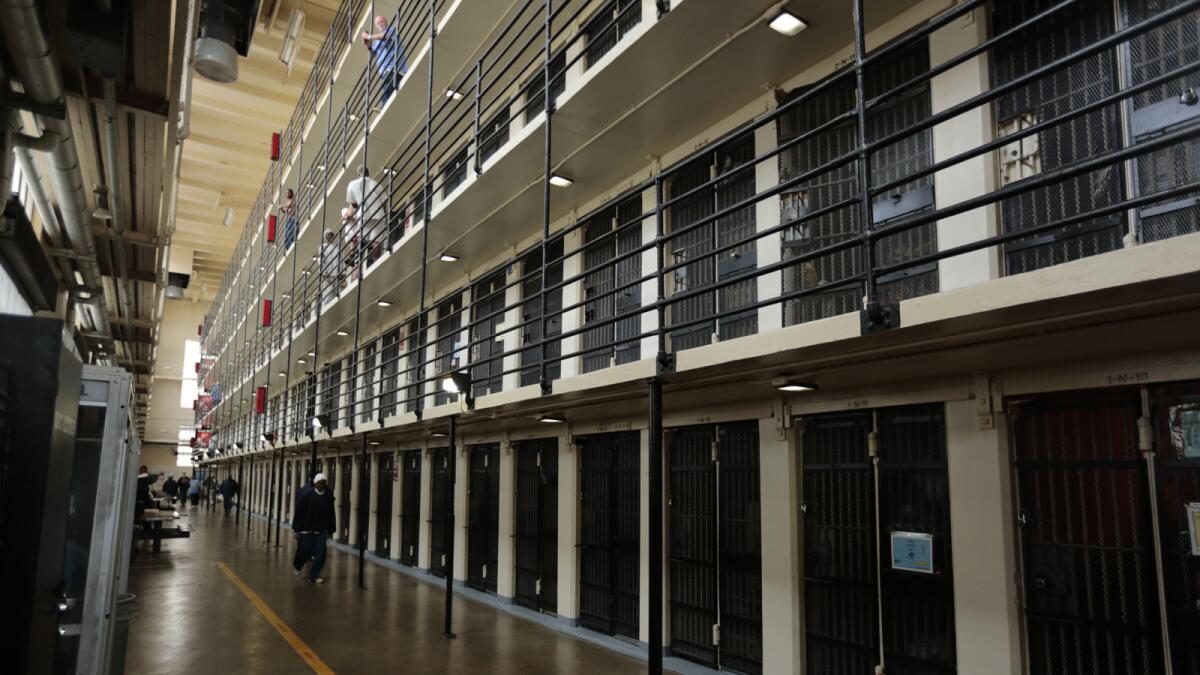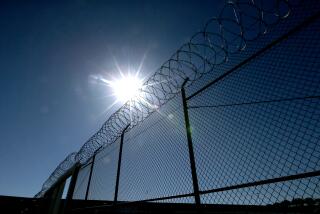Op-Ed: COVID-19 has invaded San Quentin prison. To save lives, people must be released

- Share via
Over the last several weeks, the number of people testing positive for COVID-19 at San Quentin State Prison has skyrocketed to more than 1,400, including six deaths so far. As a staff physician who provides medical care to incarcerated patients, I am devastated by the news, but sadly, I’m not surprised.
On a daily basis, our medical teams work diligently within the constraints of the prison system to limit transmission, and our patients do what they can to protect themselves in their environment, but the undeniable fact is that the state prisons are well over capacity — despite court-mandated reductions over the past several years.
The only way to prevent catastrophic loss of life both inside and outside the prison system is to significantly reduce the prison population.
The current outbreak at San Quentin has been particularly harrowing. It began after a busload of prisoners was transferred there from the state prison in Chino, where more than 800 people were infected with the coronavirus. However, what happened at these two facilities is not isolated — prisons throughout the system are struggling with infections among the staff, prisoners or both.
As of Wednesday, 5,513 state prisoners in California have been diagnosed with COVID-19 and 30 have died from the disease. That represents 4.8% of the total prison population, a staggeringly high rate of infection. For perspective, this would be equivalent to about 1.8 million Californians testing positive for the coronavirus, compared with 284,000 confirmed cases. In addition, more than 1,119 prison staff have also tested positive.
I am a primary care physician at a prison in Northern California that houses more than 2,000 people, many of them medically high-risk. Before the pandemic, I spent my days seeing patients for regular check-ups, urgent care, and treating chronic illnesses such as diabetes, hypertension, heart disease and liver disease. My patients have stepped up admirably during this horrifying ordeal, to protect themselves and each other as much as possible — wearing cloth masks, washing hands with soap, disinfecting surfaces and using hand sanitizer when it is provided. Many patients have been tested for COVID-19 because of symptoms or recent arrival or transfers. Thankfully, we have not had a significant outbreak yet. But my patients are worried because it is not possible to properly social distance and they know a contagious virus can spread like wildfire in this environment.
The majority of them have chronic illnesses that make them extremely high risk for severe illness and death if they come down with COVID-19. Quite a few of my patients have declined recommended and necessary medical procedures and referrals, out of fear of being exposed to the coronavirus at outside medical facilities, due to community spread.
Last week, the California Senate Public Safety Committee held a hearing on the outbreaks in California state prisons. During the hearing, Dr. David Sears, an expert in prison health at UC San Francisco who was brought in to San Quentin to give recommendations during the current outbreak, reported that none of his recommendations will work if they are not accompanied by immediate release of prisoners.
He said that the San Quentin prison population must be reduced by at least 50% to stop the current spread. This idea should be applied to the entire state prison population. There are several ways to achieve this, including by moving up parole hearings, allowing for more medical parole, granting clemency, and releasing older people and all those who are at low risk of re-offending, regardless of the crime of conviction. With the virus surging throughout the state, keeping it out of prisons is impossible. And without dramatic decarceration right now, there is no way to properly quarantine, isolate and socially distance inside overcrowded facilities.
Gov. Newsom and other state leaders have the opportunity to make history during this unprecedented time. This country has been trying simultaneously to control a deadly pandemic and to dismantle systems that perpetuate structural racism — which, of course, has resulted in Black and brown people suffering disproportionately from this disease.
Releasing people from prison would be a big step toward addressing these two crises at the same time. It is also our best shot at preventing more deaths among people who are in the care of the state.
Joshua Connor is a family medicine doctor and a primary care provider for incarcerated patients in California.
More to Read
A cure for the common opinion
Get thought-provoking perspectives with our weekly newsletter.
You may occasionally receive promotional content from the Los Angeles Times.










